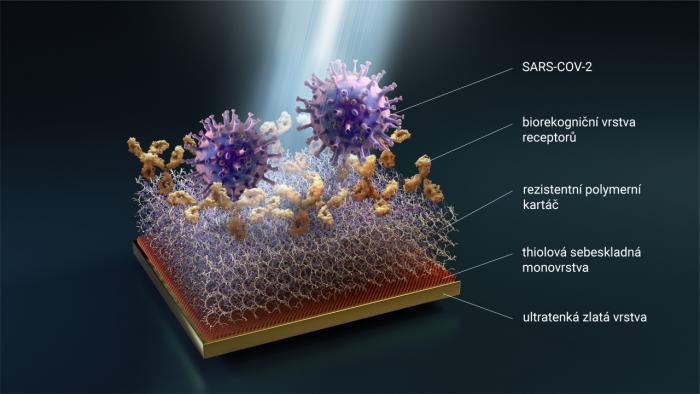New technology could enable to detect SARS-COV-2 viral particles directly - as opposed to the complicated detection of antibodies in patients’ bodies previously known as “rapid tests”. The new technology is developed by a team of researchers led by Hana Lísalová from the Department of Optical and Biophysical Systems of the Institute of Physics of the Czech Academy of Sciences. Its results are expected in the near future.
“We decided to focus on the development of a highly sensitive and transferable biosensor for the detection of coronavirus. This biosensor will detect the presence of the virus not only in bodily fluids but also in other samples such as smears from clothes or water,” explains Hana Lísalová from the Institute of Physics of the Czech Academy of Sciences.
The proposed method is based on the existing cooperation with the Civil Protection Service of the Czech State Police that was aimed to develop a transferable biodetection system for the rapid detection of pathogens in food. This project helped to accelerate the development of new technology.
Using a laboratory prototype, researchers have demonstrated the characteristics of the rapid and sensitive detection method. “For instance, we were able to detect Escherichia coli, O157:H7, and Salmonella typhi in homogenized hamburger within twenty minutes,” said Alexandr Dejneka, who cooperates on the project with Hana Lísalová. The bacteria were clearly detectable in samples as small as one millilitre. The scientists achieved a comparable level of sensitivity in detecting Hepatovirus A in food samples.
The actual testing is prearranged with the Institute of Parasitology of the Biological Centre of the Czech Academy of Sciences and the Faculty of Natural Sciences of the South-Bohemian University in České Budějovice.
Versatile technology
The biodetection systems in development are based on ultra-resistant polymer surfaces that are able to retain their functional detection properties under strenuous circumstances even if they are used with real biological media. At the same time, the technology is fully versatile and can be relatively simply adapted to a different type of monitored substance and other types of samples. The exchangeable polymer microchips at the heart of the biosensor can be re-used in the event of a negative response.
If the development of the new biochip proceeds as expected, its functional prototypes could be available in a matter of months. In the academic environment, it is possible to ensure the production of hundreds of biochips but in order to acquire more tests and to reduce the cost of biochips, it would be necessary to scale their production and find a suitable industrial partner.
The personnel and financial expenses of this project - for the accelerated development of a bio-detection system - will primarily be funded by the NCC MATCA or other projects of the Technology Agency of the Czech Republic.
Date: 8 April 2020
Contact:
Alexandr Dejneka, Ph.D., Head of Department of Optical and Biophysical Systems of the FZU.
e-mail: dejneka [at] fzu [dot] cz, tel.: 266 052 141
